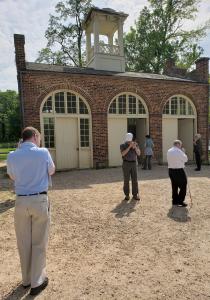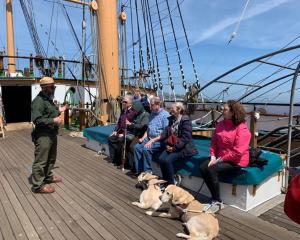UH Mānoa professor's pioneering audio description work wins national research award
University of Hawaiʻi at MānoaBrett Oppegaard, an associate professor in the School of Communications at UH Mānoa's College of Social Sciences, has been awarded the 2019 Dr. Margaret Pfanstiehl Audio Description Achievement Award for Research Development from the American Council of the Blind (ACB). The award recognizes Oppegaard's work in helping people who are blind or visually impaired.
The Dr. Margaret Pfanstiehl Memorial Award for Research and Development is made to an individual or organization for outstanding research that leads to the advancement of audio description. Pfanstiehl was one of the pioneers in the field of audio description, developing a system for live-theater description in the early 1980s.
Oppegaard is the principal investigator of The UniDescription Project, and has been studying audio description in relation to mobile technologies and locative media since joining the university in 2014. During the past five years, he has worked with fellow UH researchers and graduate students, ACB staff members and volunteers, and community partners throughout the country at U.S. National Park Service sites, refining and developing systems of audio description to help make public attractions more accessible to people who are blind or visually impaired.
In addition to producing scholarship in academic journals and for conferences, Oppegaard has managed the creation of various open-source web tools and resources to support and grow audio description as a medium worldwide. The core component of this open-source site is the powerful UniD web tool, which supports efficient, effective and no-cost production and dissemination of audio description through free mobile apps, websites and other means.
The UniDescription Project website also includes the UniD Academy, which is designed to asynchronously train interested individuals in audio description best practices at no cost.
Oppegaard, his research team and collaborators have helped to make more than 60 U.S. National Park Service sites throughout the country more accessible, including Yellowstone National Park, Yosemite National Park, the Statue of Liberty, Washington Monument and Hawaiʻi Volcanoes.
Oppegaard also has initiated four hackathon-like descriptathons to date (with a fifth scheduled for late August), in which dozens of National Park Service staff members have used the system and the training to learn and practice audio description.
The UH-based UniDescription Project has been supported by more than $500,000 in grants from the U.S. National Park Service and Google.
Photo captions:
Photo 1: Eric Bridges, American Council of the Blind's Executive Director, Doug Powell, a member of ACB’s Rehabilitation Task Force, and Pat Sheehan, Director of the 508 Program Office at the U.S. Department of Veterans Affairs, use the UniD app to explore John Brown's Fort with U.S. National Park Service staff at Harpers Ferry National Historical Park in West Virginia in May 2019.
Photo 2: Park Ranger J.R. Earnest describes a ship at the San Francisco Maritime National Historical Park to members of the American Council of the Blind, who are touring the site to test the UniD app, in April 2019, from left: Victor Clifford, Beverly Clifford, John Glass, Susan Glass, and Alice McGrath Turner. (Photo courtesy of Jo Lynn Bailey-Page).


